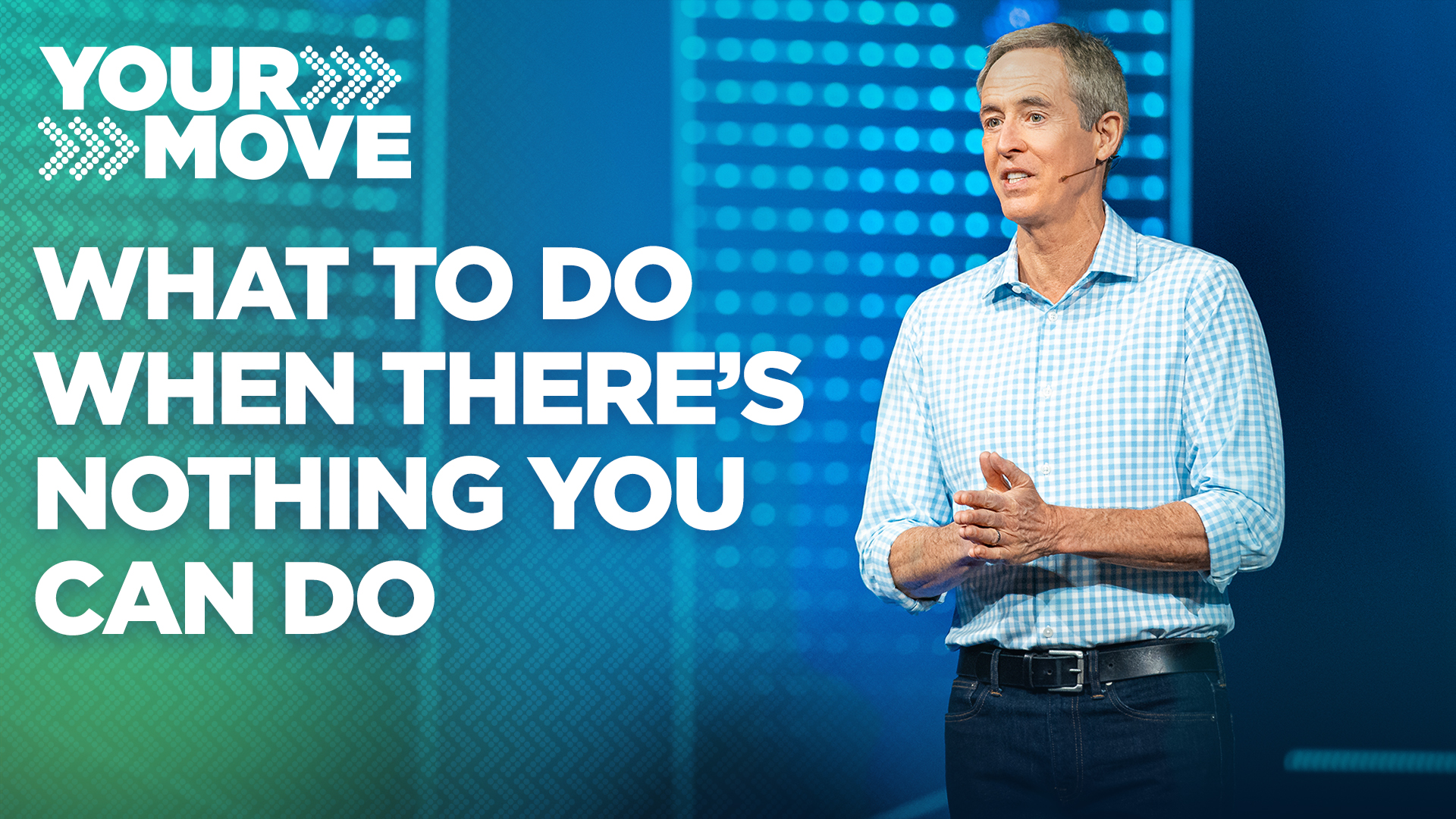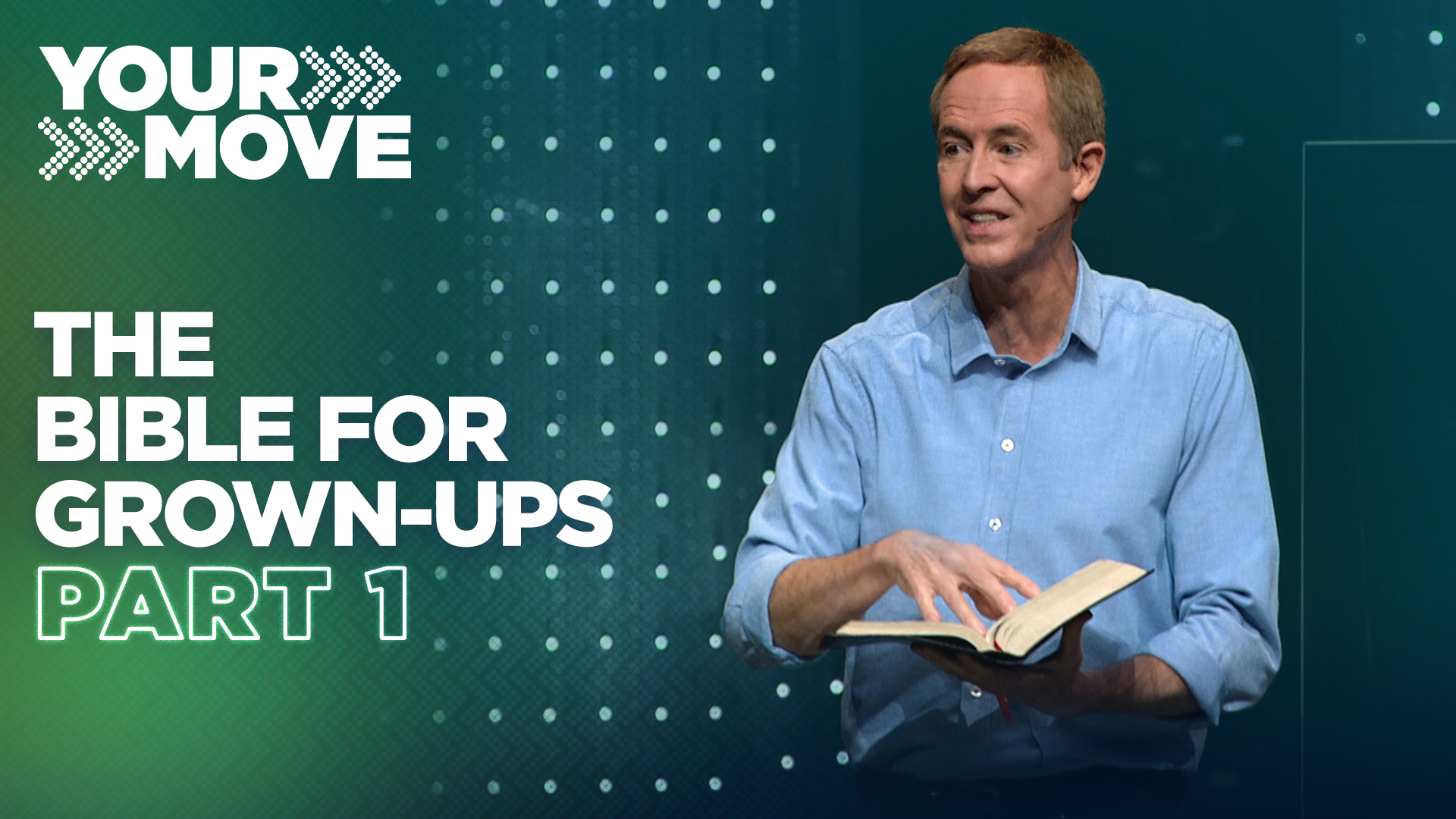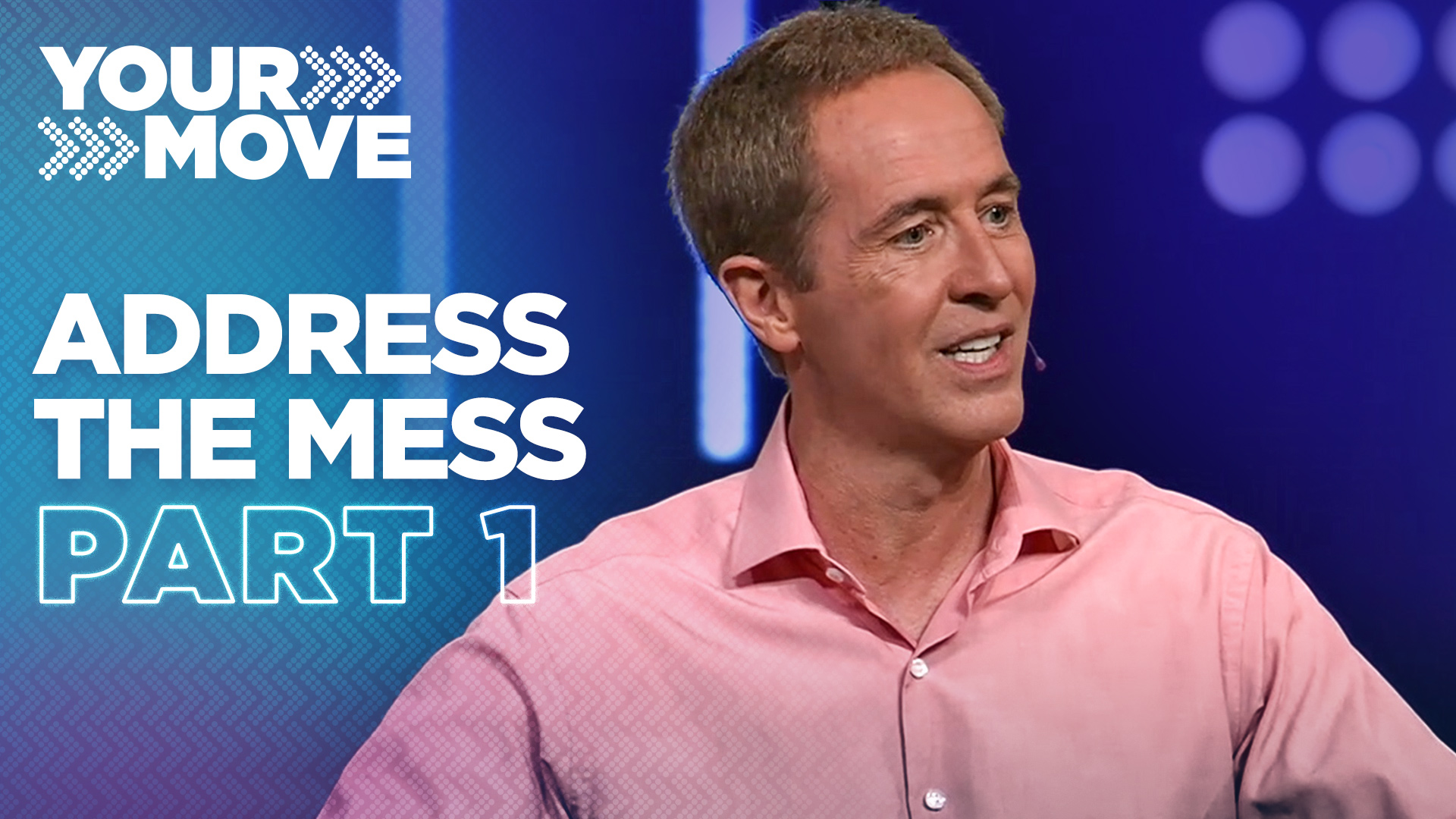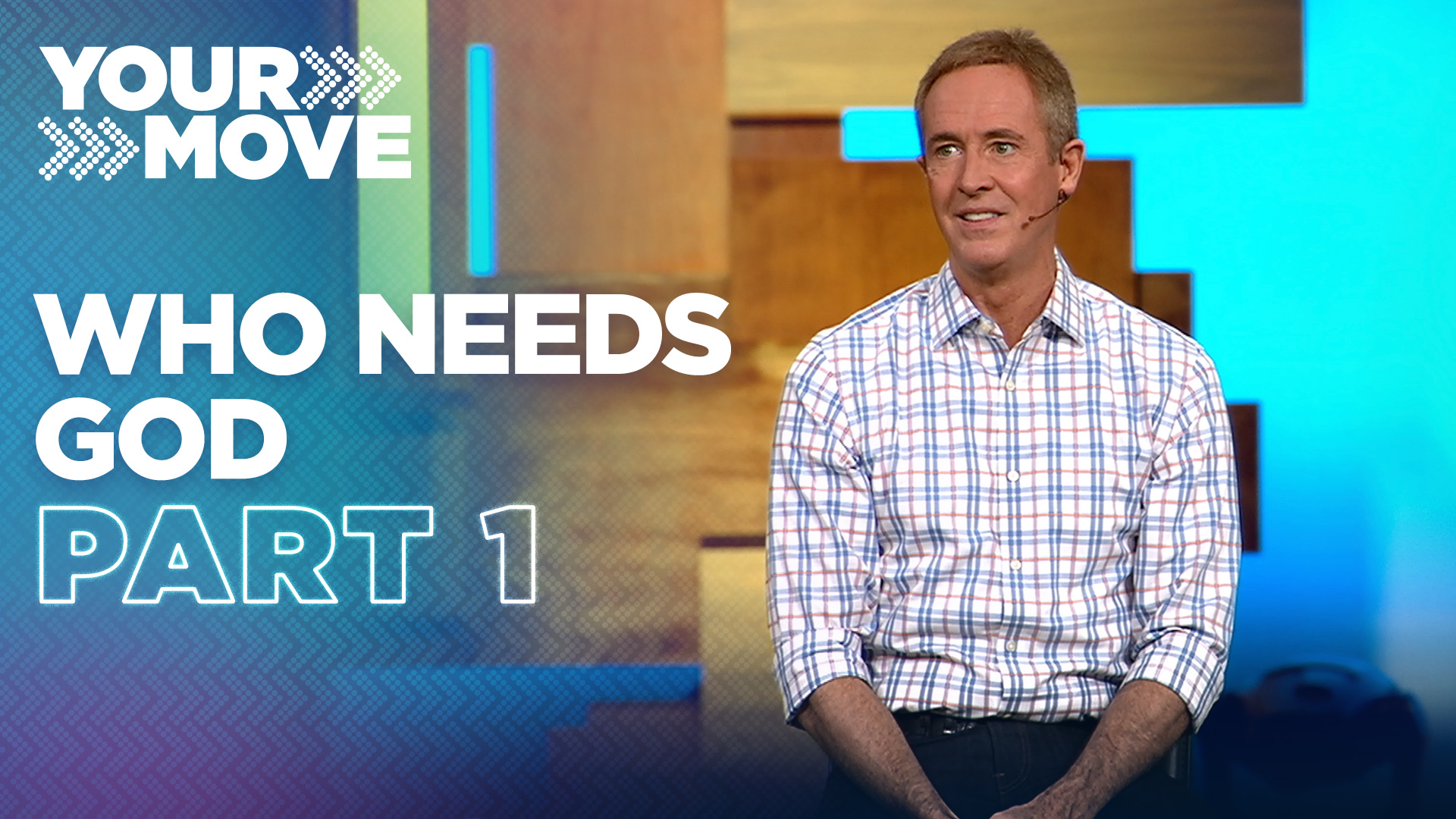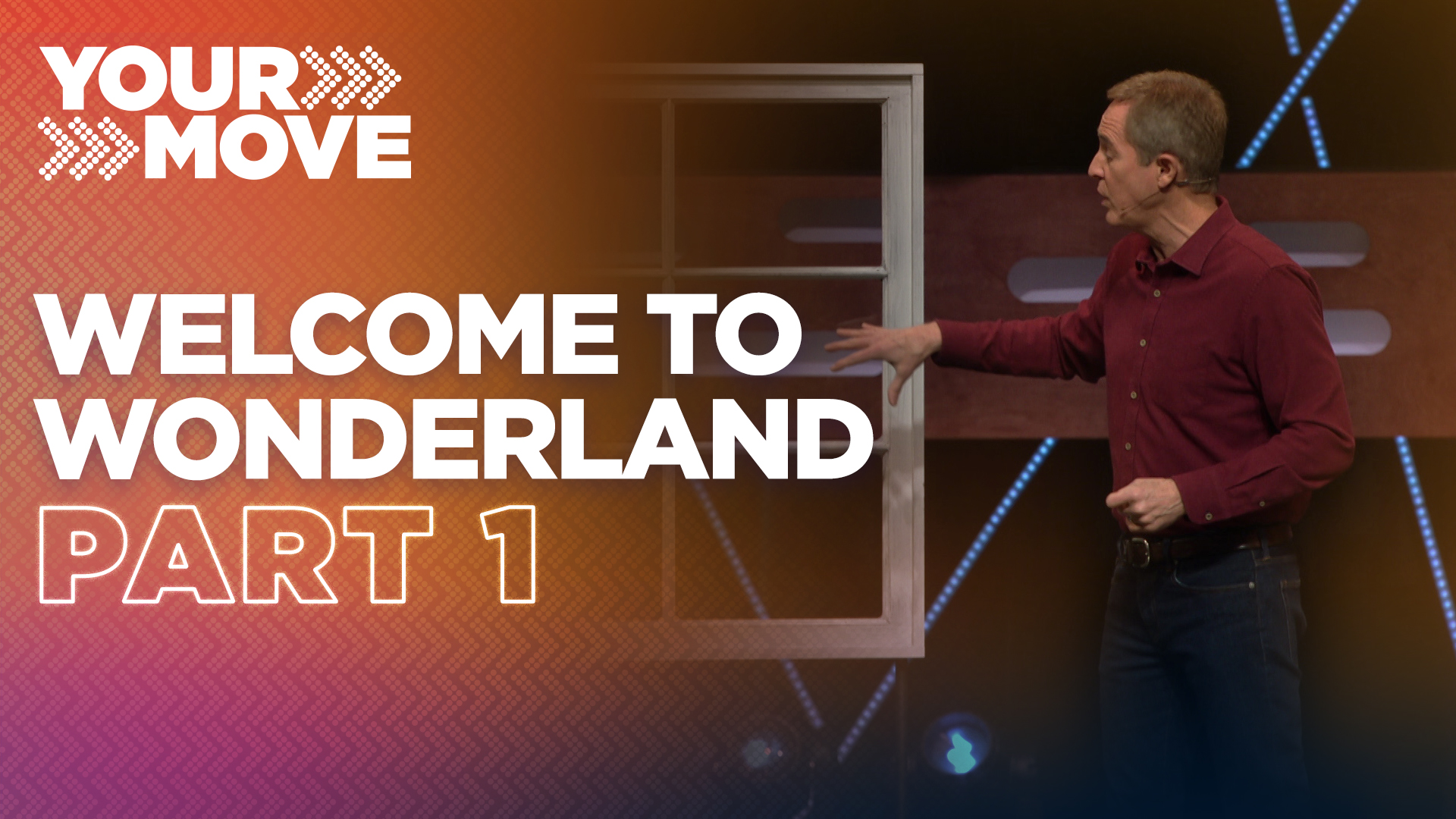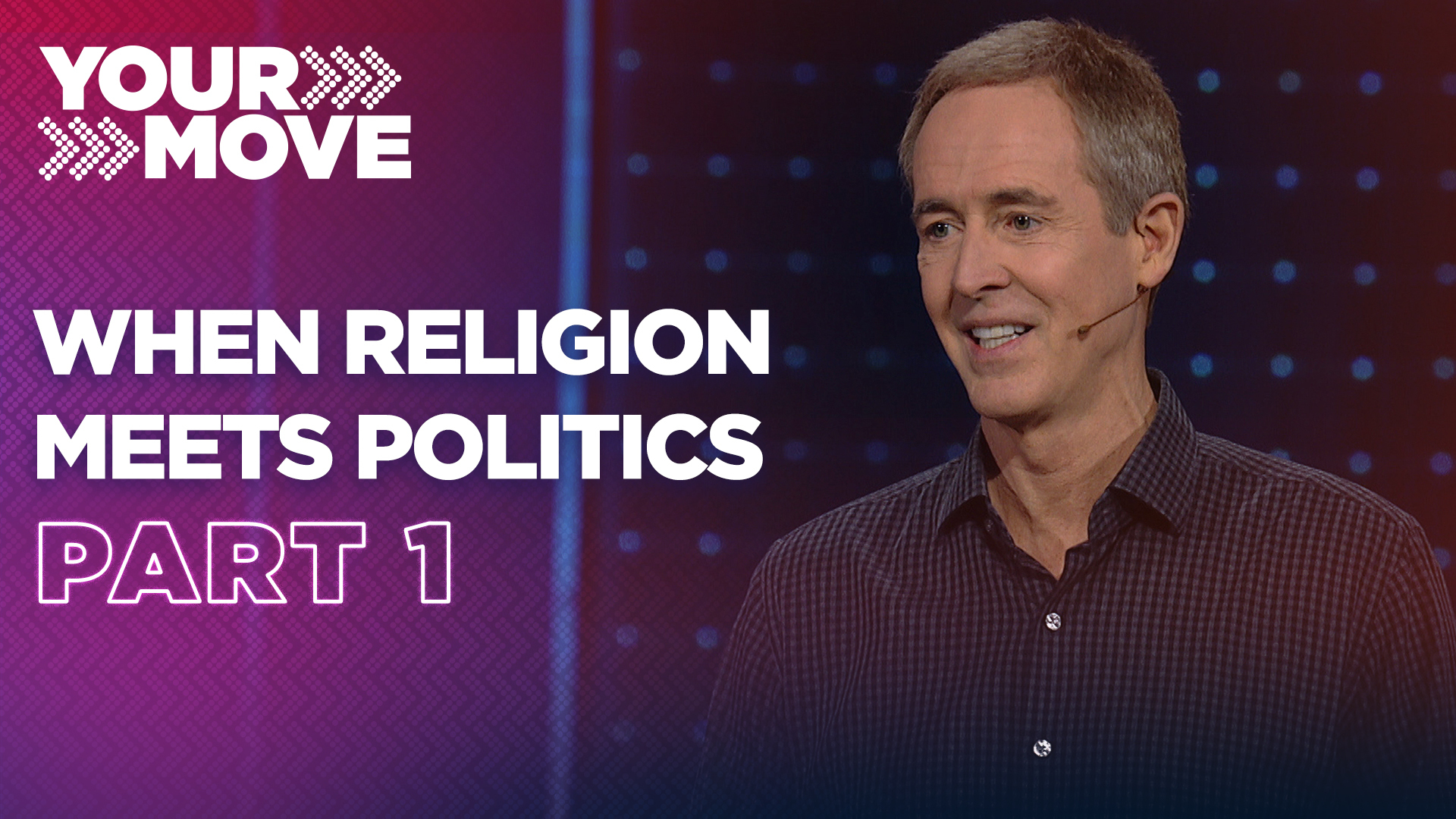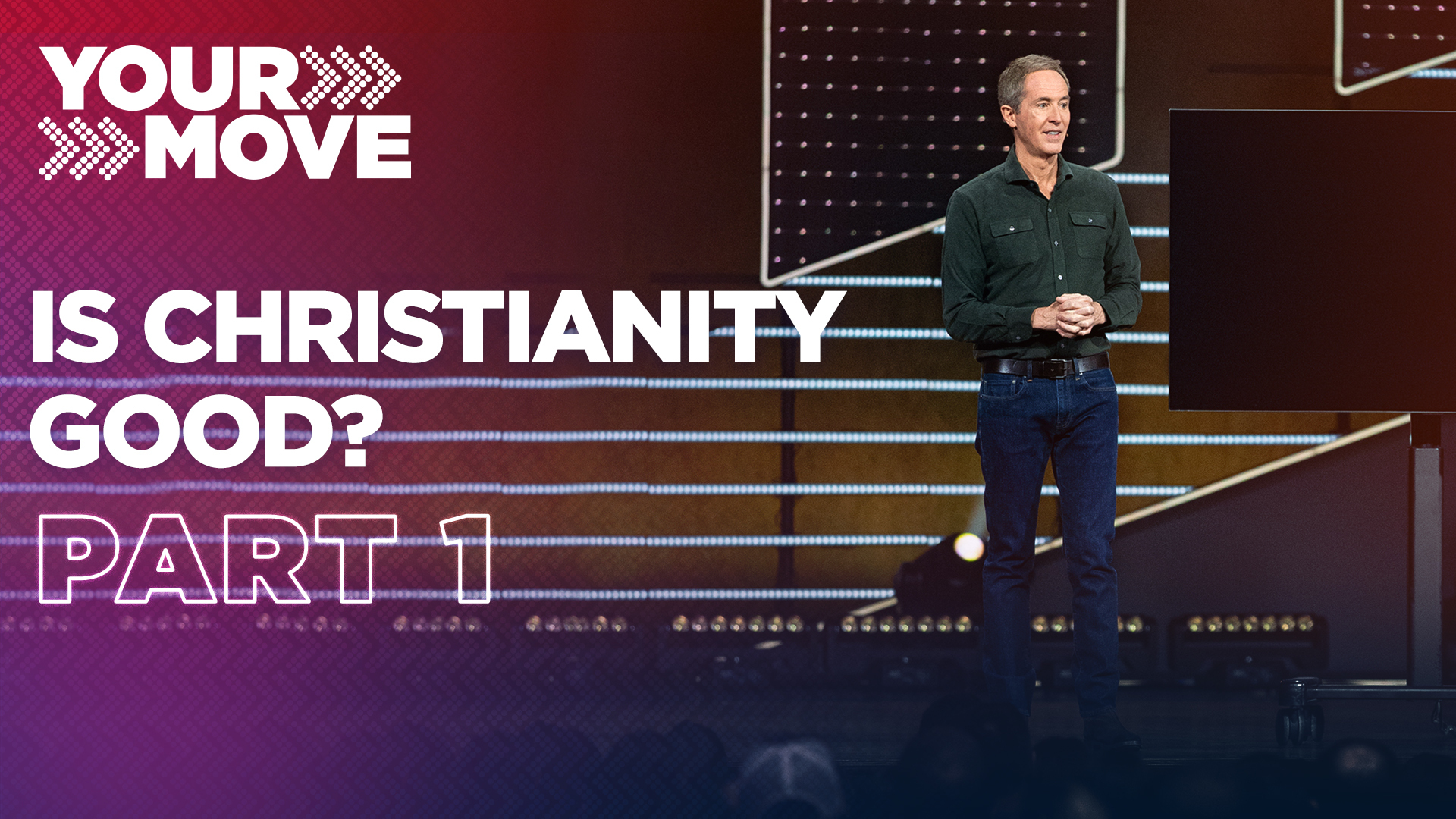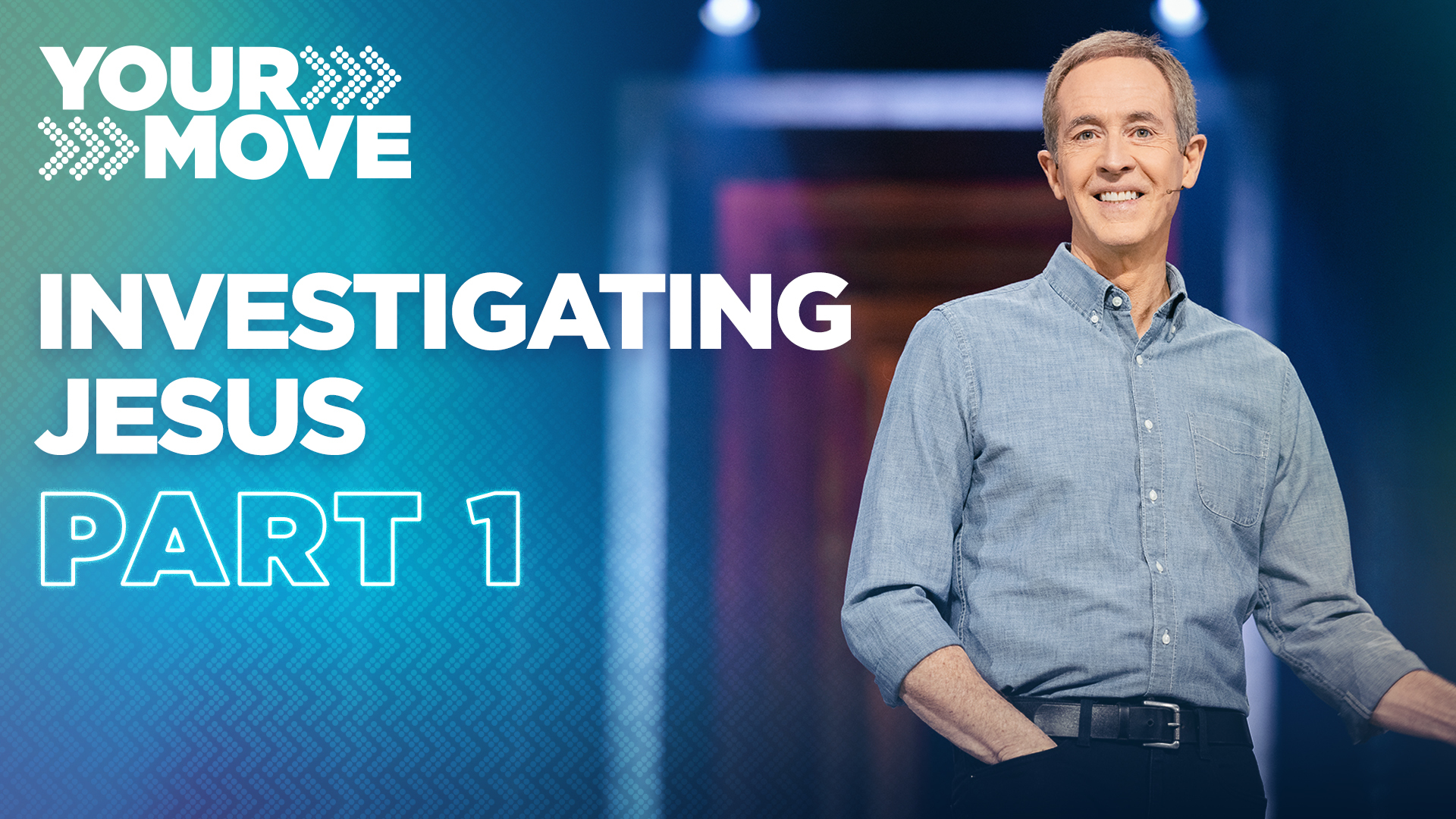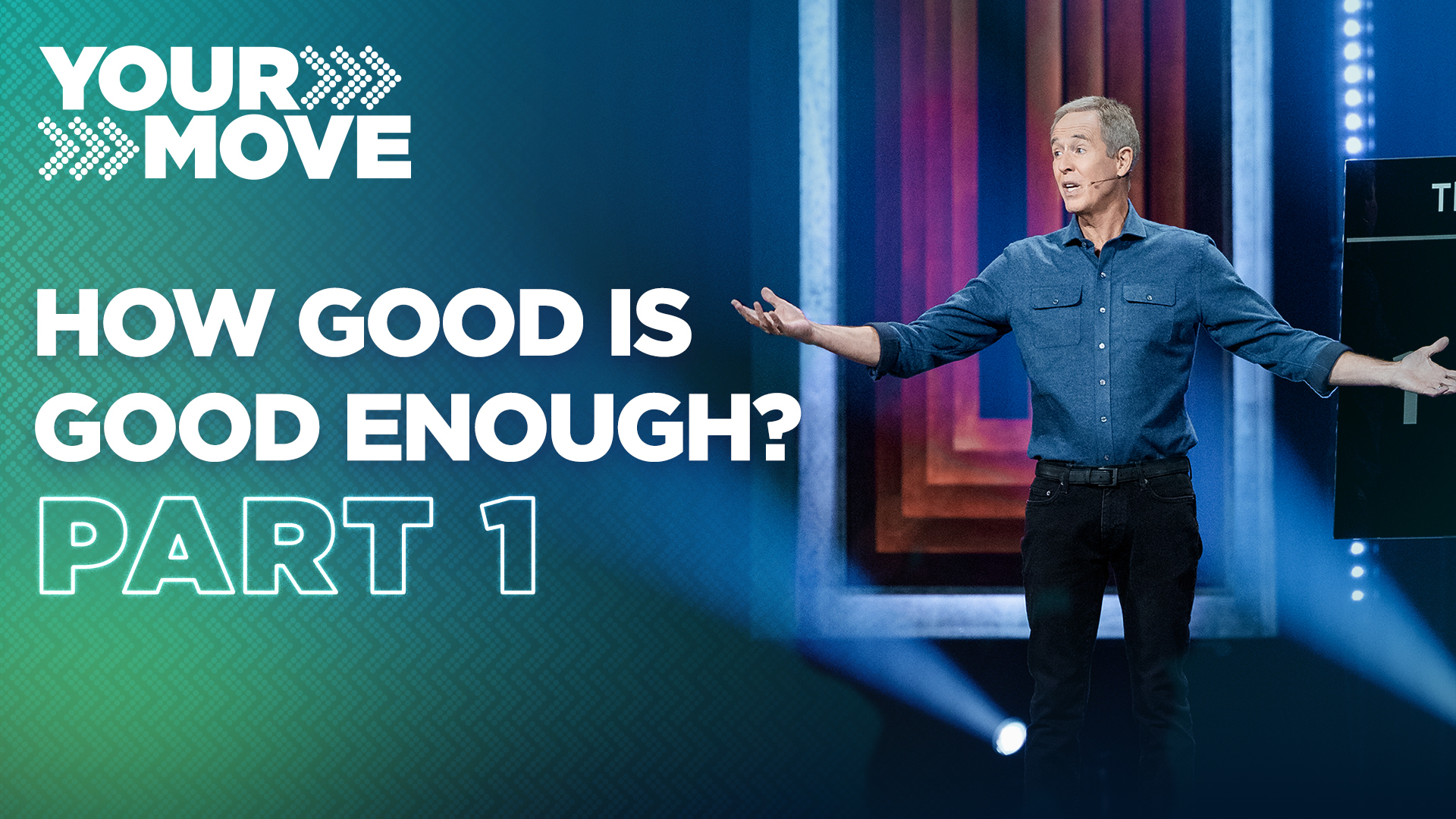We all want to be the masters of our own destinies. But what if autonomy is an illusion?
- Talk about a time when you admitted you were wrong about something. How difficult was it to admit?
- “People almost invariably arrive at their beliefs not on the basis of proof but on the basis of what they find attractive.” How does this quote by Blaise Pascal apply to your belief in or rejection of the existence of God?
- If you’ve walked away from faith, assume for a moment that God does exist. What is your reaction to that notion, and how does it make you feel? As Andy describes in the episode, can you relate to feeling guilty, accountable, or wrong?
- Do you agree that unaccountable people make regretful decisions? Why or why not?
- What if the existence of God brings forgiveness, relationship, and truth? What is attractive or unattractive about each of those ideas?
NOTE: The following content is a raw transcript and has not been edited for grammar, punctuation, or word usage.
As we wrap up this whole conversation about who needs God, I wanna ask those of you who have stepped away from faith… Maybe you’ve not stepped into atheism, maybe you have, but you’ve just kinda stepped away from the whole thing. I wanna ask you to do something that’s very, very difficult, and when I say “difficult,” I don’t mean it’s difficult for you as opposed to other people. It’s difficult for all of us.
But because you are the target audience, I wanna ask you if you would be honest. With yourself. And this is hard. And I know it’s hard because it’s hard for me. Just my experience. Whenever I look in the mirror and I’m super honest with myself, [chuckle] I always end up with a homework assignment. When I’m honest with myself, I have to walk away, and then generally, there’s someone I have to apologize to. When I’m absolutely honest with myself, there’s something I have to admit that I don’t wanna admit. There’s something that I have to own up to [chuckle] that I don’t wanna own up to. When I’m really honest with myself, oftentimes, I have to humble myself, and humility does not come natural to any of us, possibly.
But here’s something we’ve all learned as adults, and it’s simply this. This self-deception… When we deceive other people, it’s one thing. But self-deception always takes us in a bad direction. If you are not honest with yourself, you cannot get to where you need to be. If you are not honest with yourself, you are stuck. If you’re not honest with yourself, it’s a lid to growth. And here’s how we all know this. Think about how different your growing up family, your growing up life, would have been, if your dad had been honest with himself. Or your mom had been honest with herself. But instead, they played games, and they hid, and then made excuses, and they wouldn’t take responsibility.
For some of you, your family growing up experience would be completely different if somebody would have had the ability, somebody would have encouraged them to just, “Come on. Face up to what you know is true.” In fact, some of you who are divorced, you’d still be married, if either you or your spouse had had the courage to look in the mirror and say, “I’m the one with the problem.
So, for the next few minutes, I just wanna challenge those of you who have stepped away from faith to do what all of us have to do, at some point and in some arena of life. And that is… And it’s difficult to be extremely honest with yourself. Now, that may come across insulting. I don’t mean for it to be. So just track with me and maybe this will make sense as we go along.
What in the world does that have to do with anything? “Okay, Andy, you want me to be honest with myself. What does that have to do with the fact [chuckle] that I have stepped away from faith?” Three quotes, and a question. Three quotes, and a question. One of the books I read in preparation for this series was a book called ‘Mind and Cosmos,’ ‘Mind and Cosmos,’ by Thomas Nagel. Thomas Nagel is a Professor at New York University. He teaches Philosophy and Law. This is a pretty safe title, ‘Mind and Cosmos,’ but the subtitle just created havoc in the scientific community. Let me read to you the subtitle. ‘Why the Materialist Neo-Darwinian Conception of Nature is Almost Certainly False.’ This is the subtitle. This sounds like a thesis statement. ‘Why the Materialist Neo-Darwinian Conception of Nature is Almost Certainly False.’
And in this book… He’s an atheist, Thomas Nagel is an atheist. But in this book, he argues, and these are my words, not his, that essentially, in the atheist community, and for the most part, in the scientific community, the scientists have done the same thing they accuse religious people of doing. They accuse religious people of having a God of the gaps, any time we can’t explain something, we say, “God did it. God did it. God did it.” He says, essentially, the scientific community’s doing the same thing. We have gaps and we say, “Natural selection did it. Natural selection did it. Natural selection did it.” And in this book, he says, “Natural selection does not explain, and natural selection cannot explain some undeniable phenomenon.” And in the book, he talks specifically about the issue of value. And he talks about how in the world could natural selection give us value and other things. It’s a fascinating, fascinating book. But the reason I bring Thomas Nagel up isn’t because of this book, even though it’s a fascinating book, it’s because of a book that he wrote earlier, where he, as an atheist, makes an extraordinary confession.
His honesty is really astonishing. But I think… Maybe some of you watching or listening today, his honesty is liberating. And it may reflect something you’ve never been willing to admit to yourself. Because I want you to just be honest with yourself. And his honesty, I think, perhaps, may give some of us permission to be honest with ourself at a level we’ve never explored, or been willing to admit before.
Here’s what he wrote. He says this in his book, ‘The Last Word.’ “I want atheism to be true.” I haven’t just come to the conclusion based on the data. It’s bigger and bolder than that. “I want atheism to be true, and I’m made uneasy by the fact that some of the most intelligent and well-informed people I know are religious believers.” It bothers me that there are thinking people who are believers, because I want atheism to be true. This is an extraordinary admission. He goes on. He says this, “It isn’t just that I don’t believe in God, and naturally, hope that I’m right in my belief, it’s that I hope there is no God. I don’t want there to be a God; I don’t want the universe to be like that.”
Now, that’s extraordinary. And for some of you, you may have never given yourself permission to acknowledge this, because you’re smart enough to know that if you acknowledge this, you have just cracked open the door to something that is terrifying. In fact, if you crack open the door to this thought, it opens the door to something that you’re smart enough to know, “If I open that door, I’m not sure I’ll ever close it again.” Because you’re smart enough to know there is a big difference, and there is an important difference, between “I don’t believe it” and “I don’t want to believe it.”
See, “I don’t believe it” is, “I used to believe it, and then something happened, and I woke up one day and I realized I just don’t believe it.” “I don’t believe it” is, “You know something? I used to believe it, and I went to school, and I learned some things that I couldn’t reconcile with faith, and I realized as a sophomore, a junior in college, I realized when I got out of my family little bubble of religion, I got outside of it, and I just realized… It’s not that I don’t wanna believe it. I just don’t believe it.” That’s one thing. “I don’t wanna believe it” is something entirely different. “I don’t want to believe it” has to do with will. “I don’t want to believe it” has to do with, “I don’t want to believe it because. I don’t want to believe it because.” “I don’t believe it because” versus “I don’t want to believe it because.” Two very different things.
Here’s a question, as we explore this very uncomfortable topic. Did you lose faith over something that happened to you or that you read? Did you lose faith or did you step back because the information just wasn’t there, it was just too elementary, you kept getting Sunday school answers, you kept getting faith-based answers to your fact-based questions? Is that why you stepped away? Or… I’m prying a little bit, meddling a little bit. Or did you decide to stop believing because faith got to be inconvenient? Did you decide to stop believing because faith became inconvenient?
And then after you decided to stop believing, you realized, “Stop believing something isn’t an argument, so I need to go develop some support for my unbelief.” In other words, did your decision to stop believing precede the data you’ve collected to support your unbelief? Because if the issue is, “I just don’t believe. I used to believe. I don’t believe,” or, “I’m sort of ambivalent. I’ve never believed. But hey… ” There’s information. You can get questions answered. There’s all kinds of things to explore. There are all kinds of books that are contrary to perhaps what you’ve always believed. That’s one thing. If you want God to exist, seek answers. You’ll find answers.
But here’s the tough one. And here’s where I want you to be honest with yourself, and don’t go anywhere. If your departure from faith was around will and want, if your departure from faith was around, “I just don’t want it to be true. I don’t want to have to do something I don’t wanna do,” if your departure from faith was around will and want, information will never suffice.
This is why people who argue with you, their arguments just bounce off. Blaise Pascal, 17th-century mathematician, physicist, philosopher. I think he died at 39. He was a child prodigy. His father home-schooled him. He’s made some extraordinary statements. Here’s one. Look at this. He says this, “People almost invariably arrive at their beliefs not on the basis of proof… ” “People almost invariably arrive at their beliefs not on the basis of proof, but on the basis of what they find attractive.” Are we not all guilty of this? Of course we are. And here’s why. Because very few of us, and maybe none of us, I don’t know, you may be the exception, very few of us are on a truth quest. We don’t wake up everyday saying, “I just wanna know the truth! I’m willing to abandon all my presuppositions. I’m willing to abandon my entire worldview, if only I could know the truth.”
If you wake up like that everyday, I’d like to meet you, but I don’t know how much time I wanna spend with you. That’s just a very unusual thing. We’re not on a truth quest. We are on a happiness quest. “I wanna be happy. Give me a worldview, give me a set of values, give me a way of thinking that makes me happy. And if that worldview and that set of values doesn’t make me happy anymore, I’m all about changing my worldview and my set of values, because I’m not on a truth quest. It’d be nice to know what the truth is and believe the truth. But at the end of the day, I just wanna be happy.”
St. Augustine said this, he said, “We love the truth when it enlightens us. [chuckle] We hate the truth when it convicts us.” And all of you know this, we all know this, because all you have to do is think back to arguing with your parents, when you were a kid, right? When you argued with your parents, were you trying to get to the truth? Or were you trying to have your way? Were you trying to get to the bottomline, “Mom and Dad, let’s find truth. Oh, Dad, you’re right. I apologize. You enlightened me.”
No. We didn’t argue with our parents that way. We argued to get our way, not get to the truth. And as a kid, when you won the argument, sometimes, you walked away knowing, didn’t you? You just knew. If you’ve ever had an argument with your husband or your wife, and halfway through the argument… What is this? Again, how did natural selection get us here? Maybe there’s an explanation. What is this thing in us? I’m in the middle of arguing with someone, maybe someone I love, and halfway through the argument, I realize, “Uh-oh. They’re right!” And what do I do? I just keep on arguing! [laughter] Because I’m not trying to get to the truth, I wanna win the argument. It’s not about right and wrong. It’s about win. And then I win the argument because I’m smarter than somebody, right? You have a one-liner, or they have to leave earlier, we get disconnected, and I had the last word. Gotcha.
[laughter]
But when the conversation’s over, when the argument’s over, we know. We know. We won the argument. We had more facts. We had more leverage. We were better with words. [Sigh] But we know. Now, here’s what I want you to… This is tough, I know. Look, when we won’t acknowledge what we suspect to be true, and we’ve all been here, when we’re not willing to acknowledge what we suspect to be true, when we won’t look for fear of what we might see, when we won’t acknowledge what we suspect might be true, when we won’t look for fear of what we might see…
Do you know what that means? It means there’s something else in the mix. It means there’s something else going on. It means that all the arguments and all the reasons we put out there, while they may be true and while they may be give us leverage, it means there’s more to this conversation, there’s more to this energy, than we’ve been willing to acknowledge in here. This is the question today. What is that? I mean, if you’re one of those people that, honestly, you just don’t want to believe. What is that? And maybe you’ve never been willing to admit until maybe today. “Do you know what the problem is, Andy? You’re right. I got all these facts and figures and arguments, and I shut my parents down years ago, and I pulled out of church years ago, and if anybody asks me, I’ve got all three or four zingers and they just kinda melt away, but to be honest, I’d never thought about this. I just don’t want to believe.”
What is that? What is it that causes you to not be willing, or any of us? What is it in us that won’t acknowledge what we suspect to be true, or causes us not to look when we’re afraid of what we might see? I think, all of us, but today, I’m talking to those of you who have stepped away from faith, all of us need to know the answer to that question.
So, at the risk of ruining the series right here at the end, and at the risk of offending you, which I certainly don’t want to do, could it be, just could it be, could it be the reason, the real reason, that you stepped away from faith, isn’t perhaps the reasons that you give? Isn’t perhaps you’re presenting facts and arguments? Could it be one of these three things? Just, could it be? Could it be that if there’s God, you’re guilty? Could it be the things in your past? In some cases, they are so big and they’re so bold, and they’re so embarrassing. And even though you don’t like to use this word, and even though you have almost escaped this emotion, and escaped this feeling, that when you bring those things front and center, you are actually, it’s an old school word, you actually feel ashamed?
You’re actually embarrassed. And you try to keep those things locked away, and you’ve labeled them, you’ve used the cultural label for all those things. You say, “Well, when I was younger, or in the past, I made some mistakes.” But here’s what you know. I’m just asking you to crack the door open. It’s scary, it’s terrifying, I completely get that. Is it possible that you know, “If I crack the door on the fact, that it’s not just mistakes, it’s bigger than that”? That, “It moves me and it transitions me from mistakes to the fact that maybe I have sinned”? That maybe this is just bigger than “I made some mistakes,” because here’s the deal. C’mon. Your biggest mistake is you are not alone. Your biggest mistake is you hurt other people. Your biggest mistake is you owe somebody some somethings. You owe some things that you can’t ever pay back. You cannot give her back those first few years. You cannot give your kids back what it was you took from them because you were doing whatever it was you were doing.
There are some things that you cannot reconcile, you cannot make right, and of course, I understand, this is culture. We made some mistakes. But you know as well as I do, whatever it is, the residual, the aftermath, the shrapnel, the wake of those decisions, it follows you around. It just hovers there constantly. And if I crack the door open on the fact that maybe there’s God, “Oh, my gosh, what I have almost convinced myself, a fool, nobody’s perfect, and everybody’s human, I’ve just made some mistakes.” Suddenly, that just gets bigger.
And I’m gonna feel something, that, “Honestly, Andy, if I were to be honest, I don’t wanna feel that.” When they finally pulled the lid off of all of that stuff, it scared them to death. They finally admitted, “You know what? The reason I refused to look, the reason I refused to believe is, I knew that once I believe what I had reduced to a few mistakes in my past, it would come back and it would be so big and so bold, it terrifies me. But honestly, I can’t seem to shake it.” And once they take the lid off and face it and acknowledge it for what it is, they make progress. Maybe that’s your story.
The other one is this, “If God, I’m accountable.” And come on, starting with me, we don’t wanna be accountable. I don’t wanna be accountable. We all wanna play God. It’s the story of the Garden of Eden. And you may believe the Garden of Eden’s history, you may believe the Garden of Eden is myth. I’m telling you what, if it’s myth, it is the greatest myth in history. Because the story of the Garden of Eden, whatever you consider it to be, explains so much. It is the story. It is the beginning. It is the initial phase, that either somebody fabricated or it actually happened, of mankind deciding, “God, we do not need you. Who needs God? Not me, and not her. Not me, and not him.”
And in the Garden of Eden and then in all of our lives, forget the Garden of Eden, forget the book of Genesis, in all of our life, it plays out with the illusion of autonomy. That somehow, I will be my own person. I can do what I wanna do. I can make my own choices. Which always, always, always, always leads to regret. Because unaccountable people make regretful decisions. Unaccountable, “I’ll do it my way. Nobody needs to tell me what to do. I can handle it. I can manage the outcome. I can manage the consequences.” Unaccountable people always make regretful decisions.
Then you get two autonomous people and you put them in a marriage? Two autonomous people eventually have unresolvable conflict. But the problem is, and I get this, if you begin to turn in the direction of, if you begin to step back toward, if you admit God, then you’ve got to submit to God. Because you know if there is a God who’s gonna hold you accountable, suddenly, you are accountable. And I don’t wanna submit. You don’t wanna submit. Nobody wants to submit. Here’s the question: Where did that come from?
Why is it? Come on, come on. Why do we resist the things that are good for us? What is it in you? Come on, what is it in me, that we resist the things that are good for us? But I understand this. To admit God means you gotta submit to God. So we live, c’mon ain’t this true, we live loud, busy lives, until life gets our attention.
And third thing. Maybe this isn’t you. Maybe not. Maybe this is your thing. If God, [chuckle] I’m wr…
[laughter]
If God, then I’ve been wrong. Now, come on, come on, come on. Just play along with me. You don’t have to do anything. There’s not gonna be an altar call. No bid for your soul. Just play along. Look.
[laughter]
What is pride? What is that in you and in me? You cannot deny it. I’ve never even met you. I know this about you. Because you can assume it about me. What is it in us that won’t admit what we know is true? What is in us? Come on, guys, we are the worse. What is it in us? We know in our minds we’re wrong. We know in our hearts we’re wrong. We got plenty of background and history to know we’re wrong. But when it comes right down to looking somebody in the eye and saying, “I was wrong,” what makes that so difficult? You need to have an answer to that question. Because that’s something you deal with all the time. And the problem with acknowledging God is, especially if you’ve been away for a while, it’s like, “I was wrong.” But humility, c’mon, everybody knows this, humility is always the way forward. Humility, you know this, I don’t know why we resist it, humility always makes you bigger. Humility always makes you wiser. Humility always makes you smarter. Because humility makes you open to new information.
“I’ve been wrong” is the most direct route to discovering what is right. But we resist that. So this is, “Maybe I’ve touched on. Maybe I’ve danced around.” Maybe this is like, “When is this gonna be over?” Maybe this is, “Are you kidding? You’re not gonna… I know what you’re doing there, Andy. I know what you’re up to. I know what you’re doing.” I understand that. But could it be, “If God, I’m guilty. I’m accountable. I’m wrong. And Andy, I don’t wanna be guilty, accountable, or wrong. I’m just gonna stick with my arguments, and keep God at bay.”
Now, look up here, we’re going to wrap this up. These aren’t arguments for or against anything. These are just responses. The resistance that you put out, the resistance and the reluctance to acknowledge God, it’s not an argument. It’s just a response. It explains why you’ve developed your arsenal of arguments, because you are wise enough to know simply saying, “Well, I don’t wanna feel guilty. I don’t wanna be accountable. And I don’t wanna be wrong,” that’s not an argument for anything. So consequently, we have to scramble around and come up with some arguments. Because this is simply a response.
But for some of you, if you’re honest, and this is the tough one, but be honest. You don’t have to be honest with me, just yourself. Isn’t it true that your arguments against God came after your decision not to want God? Isn’t it true your intellectual arguments against the existence of God or the Bible or whatever your thing is, isn’t it true that was not first? That came second. After an initial season, or period, or event, where you decided, “I don’t want God. But not wanting God is not an argument. It is a response. I need some reasons to support my decision.” It explains why you have developed your arsenal of arguments. Because you did not want God to be.
Now, you still with me? This brings us to the good news. In fact, it’s not just good news, it’s ridiculously good news. Don’t miss this. If you’ve been doing something at home, shopping, whatever, just give me 30 seconds. Look up here. When we acknowledge, this is huge, when we acknowledge that the issue is our resistance, not God’s existence, when we are willing to acknowledge the real issue is my resistance, not God’s existence, when we’re willing to be honest with ourself and say, “Okay. It terrifies me. I’m not necessarily gonna do anything with it. But you know what? Okay, Andy. Nobody’s gonna know but me, but it’s true. The real issue for me is not God’s existence. The real issue for me is my personal resistance,” when you get there, if you will just take that baby step, you have stepped into the middle of an epic narrative.
The epic narrative of God pursuing a relationship with a rebel race that broke relationship with God. And I’ll tell you why this is great news. Because once you are willing to admit, “This isn’t about God’s existence, this isn’t actually about science, this is about my personal resistance.” Once you are willing to do that, you step into the stream of humanity that has struggled with submission to God since the very beginning of time. You are exactly where you need to be. Because if Jesus was correct, and there’s lots of evidence to say that Jesus was correct, now, specifically, if Jesus was correct about God, if God, there’s forgiveness. That your rebellion, your sin, your mistakes, become… Your sin, your mistakes, whatever you call them, they become the platform for God to demonstrate his love for you.
In fact, the Apostle Paul said it perfectly. And there’s a word in this phrase that we miss sometimes. But it’s like the big word. Paul said this. He says, “For God demonstrates… ” Demonstrates. Demonstrates. Didn’t just say it. “For God demonstrates His own love for us in this: while we were still mistakers. Hmm! While we were still, “Nobody’s perfect”-ing. While we were, “Well, everybody.” While we were still, sigh, “I did it on purpose. Okay, I admit it. I did it on purpose. I knew it would hurt her. I did it on purpose. I knew this wasn’t the right thing to do. I knew I would have regret. Sigh. I did it on purpose.” Come on. You know that about you. I know that about me. Let’s be honest. While we were still sinners, Christ died for us.
The new atheists, they make a big deal, “What is it… If there’s a God, why didn’t God just forgive everybody? Why all the blood? Why all the gore? Why did somebody have to die? Why didn’t God just say, ‘You’re all forgiven’?” Here’s the answer to that question. Because God wanted to enter into a relationship with mankind. You cannot have a relationship with someone you do not sacrifice for. If you do not sacrifice for me, I don’t know that you love me. This is so powerful. This is the Gospel. This is right at the epicenter of everything we believe as Christians.
God demonstrated his love for you. He touched down to enter a relationship with mankind, and every relationship demands sacrifice. Every offense requires forgiveness. Every offense requires coming back together in restitution. And through Christ, this is why it is the grand narrative. It is the perfect story. It’s why all the evidence points to the fact that this is actually the stream in which we live. And in which we swim. That through Christ, God demonstrated both his forgiveness and his restitution. Whew.
Do you really wanna live the rest of your life outside of that? Especially if there’s something stirring in your heart that says, “I think that might be true”? If there’s God, there’s relationship. To resist, come on, to resist accountability to God, which we all resist, to resist accountability to God is to resist relationship with God. Parents know this. When their kids rebel, what’s broken? The relationship’s broken. If there’s God, there’s truth. There’s a basis for moral law. Like we talked about last week. There’s truth. There’s a basis for justice.
Look, look, look. This is so huge. If there is God, there is an explanation for the oughts. There’s an explanation for the oughts that you embrace. There’s an explanation for the oughts that you don’t always… That don’t always govern your actions. There is an explanation for the oughts that don’t always govern your actions, but always govern your reactions. “You ought not have treated me that way.” “Now, I may treat you, but hey, don’t you treat me.” What is that? What is the big, grand ought of how you know people, other people, ought to treat you? And you know how you ought to treat them, but you don’t even do what you ought to do, but you are quick to be angry when they don’t do what they ought to do? What is that? If God, there’s truth. There’s morality. There’s a basis for justice. There is a basis for the law of nature. The law in your heart that you respond to every single day. If God, there’s forgiveness. There’s a relationship. And there’s truth.
So if the question was, “Who wants God?” At some point, none of us. But if the question is, “Who needs God?” As it turns out, all of us.


